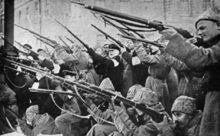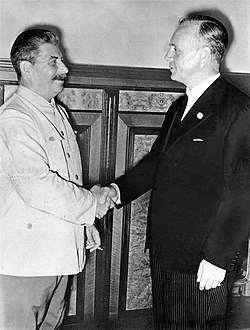The Cold War/East vs West: The Ultimate Love-Hate Relationship
Early History
[edit | edit source]
Before 1917, the West had a good relationship with Russia; they were allies in the then ongoing First World War, for example. However, in October 1917 (or November, if you're using the old Russian calendar), the Bolsheviks seized power in central Russia. Before the revolution, Russia was politically and technologically far behind the West and found itself in a terrible position - there was famine, living conditions were poor, mass poverty abounded and World War I was draining away Russia's limited money and resources.
In 1917, there were actually two revolutions, in addition to the failed revolution in 1905, and the Kornilov coup in mid-1917:
- February Revolution of 1917 - The Duma (Parliament) deposes Tsar Nicholas II, and takes control, creating a 'Provisional Government'.
- October Revolution of 1917 - Under Lenin, the Bolsheviks seize power, by capturing key buildings in Petrograd and Moscow. Shortly after, Russia made peace with Germany and withdrew from World War I.
This was not good news for the Western leaders. They had just lost a crucial ally in the war against Germany and its allies, and having witnessed the revolution in Russia they were terrified that something similar might happen in their countries.
However, the Bolsheviks did not yet have undisputed control over Russia. A civil war followed the revolution, between the Bolshevik 'Red Army' forces (led by Leon Trotsky) and anti-communist 'White Army' forces (a combination of ex-Tsarists and Western aid). Eventually, the Red Army won, and the USSR was born.
From that time onwards, relations were strained between the West and the newly formed USSR. Each had a general dislike of the other, but it was nothing compared to the level of mistrust and competition there was to be later in the real Cold War.
The Nazi-Soviet Pact 1939
[edit | edit source]
Before World War II began, the Soviets had unexpectedly signed a non-agression pact with Nazi Germany. In the treaty, each side promised not to attack the other. This seemed confusing to the spectators in the West, as Hitler hated Communism and the USSR.
Similarly, Joseph Stalin, the Soviet leader at the time, had the same hatred towards fascism and the Nazis. However, he felt that they were a threat to the Soviet Union, so he signed the pact to delay the invasion while he prepared the USSR for war. The pact lasted just two years before it was broken in 1941 when Hitler executed Operation Barbarossa - the invasion of the Soviet Union.
Operation Barbarossa
[edit | edit source]
Hitler broke the non-aggression pact on June 21, 1941 by crossing the border with 3 million troops into the Eastern, Soviet-occupied half of Poland and over the next few months, advanced eastwards, capturing major Soviet towns and cities along the way, including Kiev (now the capital of Ukraine), Kursk, Minsk and approaching the outskirts of the Soviet capital, Moscow.
There are many reasons why such a small nation as Germany posed such a heavy threat to the USSR:
- Stalin's Purge of the Red Army
Stalin thought that many army leaders in the Red Army were plotting against him, so he purged:
- 3 out of 5 marshals
- 13 out of 15 army commanders
- 8 out of 9 admirals
- 50 out of 57 army corps commanders
- 154 out of 186 division commanders
- 25 out of 28 army corps commissars
This resulted in the Red Army lacking experienced military leaders. Many of those purged were executed, although some were simply expelled from the Communist Party. The purge of the Red Army was part of a larger purge that included the intelligentsia, artists, and the middle-class.
- Stalin's assumption
Stalin had a lot of warning of a German attack from the many intelligence reports he had received, but he refused to believe any of them and thought they were from agents working for the West who were trying to deceive the Soviet Union into starting an open war against Germany.
- Lack of training & preparation
A lot of the soldiers in the Red Army were young and inexperienced and had never engaged in combat before. Their doctrine was "there won't be any invasion before 1942", so they were not prepared for the invasion.
- Underestimation of the Germans
The Red Army was fooled by a gross overestimation of its own capabilities. In reality, they were weak, unlike the Germans. The German Army was the best trained and most experienced in the world and their various victories were the result of superior tactics, communication and arms
Following the invasion, the Soviet Union joined the Allies and from then onwards, they worked together in bringing about the end of Nazi Germany and the other Axis Powers. But this was not to last. As soon as World War II was over, old grudges came to the forefront again.


The Cold War
Introduction - Background - Strategy - Truman Doctrine - Marshall Plan - Berlin Blockade - Korean War - Hungarian Uprising - Cuban Missile Crisis - USSR under Gorbachev - USA under Reagan - Arms Race - Space Race
Cover - Contents - Study Guide
Please read the page creation guidelines before creating a new page.
